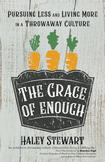Review: A radical approach to combatting throwaway culture
“If there is one word to describe modern culture,” writes Haley Stewart, “it might be unsatisfied. No matter how much we have, it’s never enough.”
In her new book, The Grace of Enough: Pursuing Less and Living More in a Throwaway Culture, Stewart (who blogs at Carrots for Michaelmas and co-hosts the popular podcast Fountains of Carrots) gets to the heart of this modern, consumeristic malaise. She urges readers to make sure that their attachments to physical things aren’t keeping them from lives built on joyful, self-sacrificial love and gratitude for the gifts God has given them.
The Grace of Enough is a readable and relatable memoir that incorporates Catholic theology, cultural commentary, and practical guidance for personal and spiritual growth. In it, Stewart recounts the story of how she and her husband Daniel made the decision to uproot their family from their Florida home, selling their house and leaving Daniel’s job behind to spend a year living on a cooperative farm in Texas. They squeezed their three children into a two-bedroom apartment with no flushing toilets. The experience taught them to ask themselves what really matters, articulate what they wanted to spend their lives pursuing, and then go after it. Stewart encourages her readers to do the same, intentionally building
habits that can help us reorient ourselves toward the Gospel…. living simply, offering hospitality, reviving food culture, reconnecting with the land, nurturing community, prioritizing beauty, developing a sense of wonder, being intentional about technology, seeking authentic intimacy, and centering life around home, family, and relationships.
Haley Stewart's The Grace of Enough is a readable and relatable memoir that incorporates Catholic theology, cultural commentary, and practical guidance for personal and spiritual growth.
As she explains what inspired their decision to alter their lives so radically, Stewart draws heavily on the writings of Pope Francis, who often warns against the toxic effects of “throwaway culture.” As Stewart points out, this term doesn’t simply refer to a reliance on disposal products. It also refers to our attitudes toward other human beings. In short, it is
the idea that God’s earth and his creatures are commodities to be used and discarded when they become unwanted…. Anytime we treat those God loves as inconveniences and annoyances rather than unrepeatable, irreplaceable creatures made in the very image of God, we are acting in accordance with the throwaway culture. Anytime we fail to see and respect God’s creation with the wonder it deserves, we fall short of the Gospel.
This emphasis on living out the Gospel distinguishes Stewart from the trendy devotees of minimalism who have gained prominence in recent years. As Stewart points out, the problem is not theamount of stuff we have. It’s our attitude toward that stuff. “While it’s easy to see consumerism at play in a McMansion,” she observes, “someone in the tiny house movement can be just as obsessed with possessions.” The point is not to own fewer things; it’s to rid ourselves of disordered attachments that distract us from God.
As Stewart warns, consumerism corrodes our own happiness and virtue. It also causes us to become sinfully hardened to the needs of others. “By spending when it is unnecessary, I am actually depriving others who do not have enough,” she writes. “If we have more than we need, the extra doesn’t belong to us.”
Consumerism corrodes our own happiness and virtue. It also causes us to become sinfully hardened to the needs of others.
While Stewart’s own story is one of dramatic change, she emphasizes that not everyone is called to take such drastic measures. She offers practical questions to help readers evaluate how their own everyday decisions line up with their beliefs. For Stewart’s husband, this self-evaluation led him to leave a soul-sucking job that he didn’t enjoy.
Unfortunately, the book doesn’t provide much practical guidance for people who love their jobs but struggle to balance them with prioritizing family and home (let alone the kind of quiet time in nature or lovely slow-food, multi-course dinner parties Stewart describes). Still, the principles she lays out are sound, even if figuring out to how to apply them will take work on the reader’s part. Luckily, the book is compelling enough to inspire readers to find their own ways of living out the Gospel’s radical call to simplicity.
This article also appeared in print, under the headline “The call to simplicity,” in the February 18, 2019, issue.











